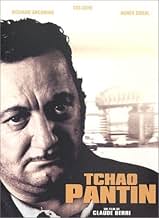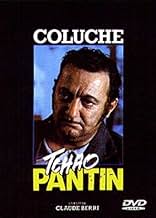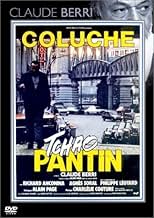AVALIAÇÃO DA IMDb
7,3/10
3,4 mil
SUA AVALIAÇÃO
Adicionar um enredo no seu idiomaA story of an odd friendship - and the unexpected consequences.A story of an odd friendship - and the unexpected consequences.A story of an odd friendship - and the unexpected consequences.
- Prêmios
- 5 vitórias e 7 indicações no total
Agnès Soral
- Lola
- (as Agnes Soral)
Philippe Léotard
- Bauer
- (as Philippe Leotard)
Mohamed Ben Smaïl
- Mahmoud
- (as Ben Smail)
Mickaël Pichet
- Mickey
- (as Mickael Paul)
Vincent Michel Paul Filliatre
- Momo
- (as Michel Paul)
Avaliações em destaque
26 years later, the movie still has a cult on its own in France (and maybe in some other countries, I'm not aware of that).
Of course the fact that Coluche, a famous french comedy and stand-up artist, died too soon at 42 (in 1986, 3 years after the movie was released) is no stranger to that... not to mention it was his very first (and last) dark role - a deadbeat gas station employee in Paris seeking revenge -and somewhat redemption- by hunting down the killers who murdered his only friend, a young lowlife drug dealer.
Some lazy critics here and there mentioned there was some kind of Melville, Cassavetes and Scorsese influences in the movie but to me, they couldn't be more wrong. Take a close look at it and you won't find any trace of "Taxi Driver" or "Gloria" in it, despite Claude Berri, the director, has tried so hard to put some of these influences in his film.
It's basically a classic urban drama in 2 distinct parts (the "bound of trust / friendship" part 1 and the "hunt/revenge/redemption" part 2, seen in many movies before and after this one) but the tremendous ghost-like interpretation of Coluche (who was facing drug addiction and sentimental issues at the time) and the extraordinary master work of D.P. Bruno Nuytten took it all to rocket the movie to critic and commercial success.
Even if a few script holes might bother some viewers (especially a detective character -called Bauer- who seems to appear/disappear only to provide informations) the wandering of these shadow-like characters won't be forgotten for a long time and the very ending could ruin your day. Or even your week.
Of course the fact that Coluche, a famous french comedy and stand-up artist, died too soon at 42 (in 1986, 3 years after the movie was released) is no stranger to that... not to mention it was his very first (and last) dark role - a deadbeat gas station employee in Paris seeking revenge -and somewhat redemption- by hunting down the killers who murdered his only friend, a young lowlife drug dealer.
Some lazy critics here and there mentioned there was some kind of Melville, Cassavetes and Scorsese influences in the movie but to me, they couldn't be more wrong. Take a close look at it and you won't find any trace of "Taxi Driver" or "Gloria" in it, despite Claude Berri, the director, has tried so hard to put some of these influences in his film.
It's basically a classic urban drama in 2 distinct parts (the "bound of trust / friendship" part 1 and the "hunt/revenge/redemption" part 2, seen in many movies before and after this one) but the tremendous ghost-like interpretation of Coluche (who was facing drug addiction and sentimental issues at the time) and the extraordinary master work of D.P. Bruno Nuytten took it all to rocket the movie to critic and commercial success.
Even if a few script holes might bother some viewers (especially a detective character -called Bauer- who seems to appear/disappear only to provide informations) the wandering of these shadow-like characters won't be forgotten for a long time and the very ending could ruin your day. Or even your week.
Classic dark French psych thriller featuring Coluche, better known for his stand up comedy dressed in blue and white striped dungarees - Andy Pandy style. His acting as the sad middle aged loser Lambert should have earned him an Oscar.
Having lived in the area where the film is set, (and worked in an auto repair shop)the atmosphere and the photography are spot on. Very sad, complex and entertaining.
If you like this, watch Subway and Diva. The title derives from the area where the film is set - Pantin, a working class quarter in North Paris, and should be with first letter in caps.
Having lived in the area where the film is set, (and worked in an auto repair shop)the atmosphere and the photography are spot on. Very sad, complex and entertaining.
If you like this, watch Subway and Diva. The title derives from the area where the film is set - Pantin, a working class quarter in North Paris, and should be with first letter in caps.
Sometimes, the "magic" of cinema seems to take hold of us.
The two main characters are superb. So is cinematography. Everything is "in the dark, humid, without hope". Lanky Lola (1.78 m), while providing the inevitable love interest, is quite gelid and stolid, so her beauty (rain scene!, she awakening chez Lambert!) is not overtly "too much".
Bensoussan is a stupid kid, while Lambert... what a script! This should be required viewing for budding plot writers. He speaks seldomly, bluntly, seemingly without passion, world wearily, like a philosopher who decided to toss the world aside, as "a useless hypothesis". Gradually we get to know his intentions, which are not clear from the beginning (he's a master at deception :)!), but make sense afterwards. Unlike many Hollywood commercial thrillers, that try to be witty and only end up being preposterous. Or "revenge" films alla Stallone and Bronson, without any emotion because there's nothing to "balance" the killing spree.
This is a "cartesian" movie. "Clear and disc tint" ideas. If issued by a "gas station clerk", well, that's the master's disguise!
The Paris we witness is not the postcard's or Bardot's: everything is seedy, "the system" is rotten, like the copper Bauer's synthesis near the end: "There'll always be another one".
The ending is fine! Seldomly had I thought: "this should end right here", and it did.
IMDb reviewers agree on Bruno Nuytten (DP)'s work. Luckily enough, I hadn't read those reviews, and while watching even the first minutes I said: "what a good 'atmosphere'". That's a good work: noticeable even without "knowing it's something important".
Berri doing this shows a hidden potential. Pity he didn't do more of the genre! Maybe he "needed" all this "sun drenched Southern France" to make one "night" film...
I agree with IMDb reviewers like gregory-joulin about its two-part structure, and with Bob Taylor that probably the first part is the best. But I admit it: I felt more with the second. "Plot holes"? Many. But who won't remember the "murder by the small filling station" or the way he swiftly avoids Bauer's questioning. Unassuming, without hesitating, thus lethally. Just like what follows suit...
I liked his "method of interrogation": breaking the mobster's motorbike (not the man). And the way he answers to Bauer on why he was't working: (seeming concerned) "With all that happened, I had to take a few days off".
(About this film) Lambert would just quip: "Watch it".
The two main characters are superb. So is cinematography. Everything is "in the dark, humid, without hope". Lanky Lola (1.78 m), while providing the inevitable love interest, is quite gelid and stolid, so her beauty (rain scene!, she awakening chez Lambert!) is not overtly "too much".
Bensoussan is a stupid kid, while Lambert... what a script! This should be required viewing for budding plot writers. He speaks seldomly, bluntly, seemingly without passion, world wearily, like a philosopher who decided to toss the world aside, as "a useless hypothesis". Gradually we get to know his intentions, which are not clear from the beginning (he's a master at deception :)!), but make sense afterwards. Unlike many Hollywood commercial thrillers, that try to be witty and only end up being preposterous. Or "revenge" films alla Stallone and Bronson, without any emotion because there's nothing to "balance" the killing spree.
This is a "cartesian" movie. "Clear and disc tint" ideas. If issued by a "gas station clerk", well, that's the master's disguise!
The Paris we witness is not the postcard's or Bardot's: everything is seedy, "the system" is rotten, like the copper Bauer's synthesis near the end: "There'll always be another one".
The ending is fine! Seldomly had I thought: "this should end right here", and it did.
IMDb reviewers agree on Bruno Nuytten (DP)'s work. Luckily enough, I hadn't read those reviews, and while watching even the first minutes I said: "what a good 'atmosphere'". That's a good work: noticeable even without "knowing it's something important".
Berri doing this shows a hidden potential. Pity he didn't do more of the genre! Maybe he "needed" all this "sun drenched Southern France" to make one "night" film...
I agree with IMDb reviewers like gregory-joulin about its two-part structure, and with Bob Taylor that probably the first part is the best. But I admit it: I felt more with the second. "Plot holes"? Many. But who won't remember the "murder by the small filling station" or the way he swiftly avoids Bauer's questioning. Unassuming, without hesitating, thus lethally. Just like what follows suit...
I liked his "method of interrogation": breaking the mobster's motorbike (not the man). And the way he answers to Bauer on why he was't working: (seeming concerned) "With all that happened, I had to take a few days off".
(About this film) Lambert would just quip: "Watch it".
Claude Berri is one of the great artists of family life in French cinema. I have enjoyed so many of his films about youth, courtship, marriage and fatherhood: Mazel Tov, Le cinéma de Papa, La première fois, Un moment d'égarement. The first half of Tchao Pantin works well in this framework, but the second half is just a routine revenge story.
I didn't really respond to the alcohol-blunted efforts of Coluche to rally himself to avenge the killing of Richard Anconina, nor did Agnès Soral's emotional about-face--deciding to help Coluche find the killer--seem believable. This actress has a very inexpressive face, and body to match. A tribute to Bruno Nuytten's wonderful cinematography is in order: there really is nobody like him for rainy night scenes. I'll give 10-10 for Coluche and Anconina, and zero for the rest.
I didn't really respond to the alcohol-blunted efforts of Coluche to rally himself to avenge the killing of Richard Anconina, nor did Agnès Soral's emotional about-face--deciding to help Coluche find the killer--seem believable. This actress has a very inexpressive face, and body to match. A tribute to Bruno Nuytten's wonderful cinematography is in order: there really is nobody like him for rainy night scenes. I'll give 10-10 for Coluche and Anconina, and zero for the rest.
Unique because it is the only crime movie made by Claude Berri; unique because this is also the only crime movie - and also maybe drama - in which Coluche played, who was a comedy actor ( on stage before going to the cinema industry) ; unique because it is one of the last crime film of the French industry before the arrival of Olivier Marchal, nearly twenty years later. But in the mean time, in 1997, you had LE COUSIN, made by Alain Corneau, and also J'IRAI AU PARADIS CAR L'ENFER EST ICI from Xavier Durringer. So, after the amazing LA BALANCE, TCHAO PANTIN is the French crime genre swan song before eighteen years; thanks to the TV industry with its silly crime detective series that diverted audiences from the theaters. And unique because it is a very gloomy, poignant and realistic crime movie, that grabs you to the guts, the blood, no one human can stay cold in front such a feature. No one. Philippe Leotard excellent in the ambiguous cop character, the cop using Coluche's character to get rid of the mobsters. And the most poignant thing is the untold link between Coluche's character, who lost in son a long time ago, and who begins to consider Richard Anconina's character as a kind of surrogate son. The audience guesses it, understands this, without the need to explain anything by useless dialogues. And maybe also Anconina looks at Coluche as a surrogate father. That's true story telling, and not bla bla bla.
Você sabia?
- CuriosidadesThe title "Tchao, Pantin" became a very well-known expression in France to define a comedian's spectacular dramatic breakthrough, in reference to Coluche who only starred in comedies prior to the film and earned the César for his performance. The term can also be used in a derogatory way when a comedian's dramatic film fails to achieve the same success and then gets dismissed as a wannabe "Tchao pantin".
- ConexõesFeatured in Un jour, un destin: La face cachée de Coluche (2008)
- Trilhas sonorasLes Nuits sont trop Longues
Music by Charlélie Couture
Lyrics by Charlélie Couture
Performed by Charlélie Couture
Principais escolhas
Faça login para avaliar e ver a lista de recomendações personalizadas
- How long is So Long, Stooge?Fornecido pela Alexa
Detalhes
- Data de lançamento
- País de origem
- Idioma
- Também conhecido como
- So Long, Stooge
- Locações de filme
- Empresa de produção
- Consulte mais créditos da empresa na IMDbPro
Contribua para esta página
Sugerir uma alteração ou adicionar conteúdo ausente


























